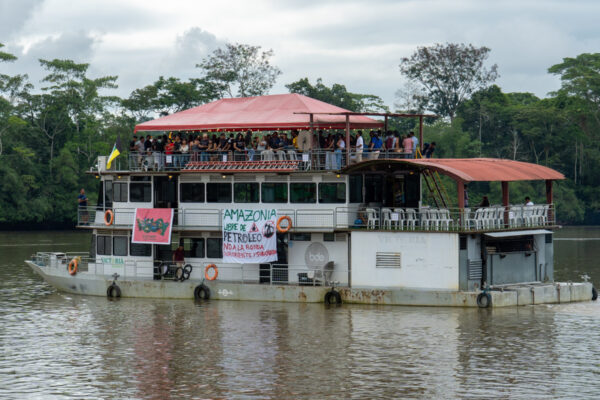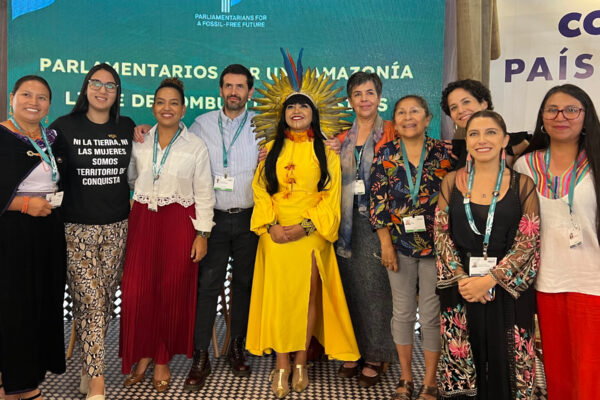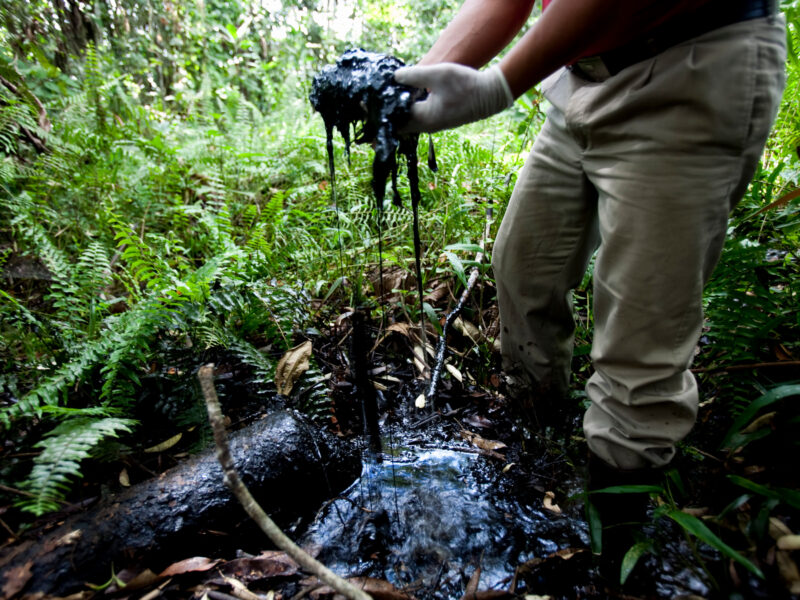Another twist has emerged in a decades-long legal battle pitting residents of Ecuador’s Amazon forest and their controversial trial attorney against one of the world’s largest energy companies.
Environmental advocates released a video today that they describe as evidence of attempts by Chevron to skirt Ecuadoran law and cover up contamination of the Amazon.
The footage, shared exclusively with VICE News by the environmental group Amazon Watch and released to the public on Wednesday, appears to show workers associated with Chevron looking for clean, uncontaminated soil but instead finding samples tainted with crude oil. The work appears to take place in an area of the jungle that has been the focus of a lawsuit between Chevron and local residents, who claim that the company is responsible for oil spills that have damaged their health and the environment.
Representatives from Amazon Watch said that they were mailed 51 DVDs of internal Chevron videos in April 2011, including those shown to VICE News. No return address was listed on the package, which the group says is no longer in its possession. Along with the DVDs, the envelope included a note that read: “I hope this is useful for you in the trial against Texaco/Chevron! A friend from Chevron.”
Chevron purchased Texaco in 2001, assuming its assets and legal liabilities.
Steven Donziger, the lawyer representing the Ecuadoran residents, and Amazon Watch, which has advocated on behalf of them, say that Chevron conducted the inspections shown on the video in anticipation of a visit to the area by Ecuadoran court officials – a practice that they argue violated the law while illustrating the extraordinary lengths the company has gone to cover-up its toxic legacy.
Chevron denies those claims and points to a recent US court ruling against Donziger.
In 2011, an Ecuadoran court found Chevron liable for $19 billion in environmental cleanup costs and punitive damages stemming from oil contamination in the Amazon between 1964 and 1990 committed by Texaco. Two years later, Ecuador’s highest court upheld the ruling but reduced Chevron’s liability to $9.5 billion.
Though Chevron petitioned to move the trial from the United States, where the plaintiffs originally filed their class action lawsuit in 1993, to Ecuador, the company filed suit back in the US in 2011, claiming that the Ecuadoran judicial process was fraudulent. In March 2014, New York federal court Judge Lewis Kaplan ruled in Chevron’s favor, finding Donziger and his team guilty of attempting to extort money from the company and obstructing justice by ghostwriting the court’s judgment.
Amazon Watch says that Chevron’s sampling took place in March 2005, ahead of the Ecuadoran court’s examination of water and soil quality and its consultation with nearby residents. Donziger and Amazon Watch claim that the video footage in their possession is evidence that Chevron was looking for clean areas from which they might be able to encourage the court to sample.
In the video shown to VICE News, an exchange between two individuals who address each other as Dave and Rene appears to indicate that they expected to find soil samples free of any oil contamination.
“Good news,” Dave says with apparent sarcasm. “Petroleum.”
“No! No!” responds Rene. “Check it again.”
“Well, do you want to smell it? I think it is,” Dave says to Rene, as the two men examine a soil core sample.
Rene sniffs the sample and demurs playfully for a moment before conceding, “Okay, it is – it is, it is.”
“Because I don’t know what this fungus… this is,” says Dave.
“Well, you might as well stop them now,” puts in Rene. “Stop them. Just, uh – yeah, we’re done here… We’re trying to find a clean core, and we obviously we didn’t go out far enough.”
“Nice job, Dave,” he continues. “Give you one simple task: Don’t find petroleum.”
“Who picked the spot, Rene?” Dave replies.
“I’m the customer,” says Rene. “I’m always right.”
In addition to what appears to be Chevron soil sampling operations, the video includes interviews with Ecuadorians who complain of water contamination and health problems that they attribute to oil pollution. Amazon Watch and Donziger claim that the interviews were conducted by Chevron.
In one segment, an unidentified male who remains off-camera speaks with a woman named Merla who says that she has lived in the area for over 30 years.
“We’ve had our cows die there,” she says. “Why did the cows die? Because they drank the water where the oil had spilled. Back then, that whole area was full of crude oil. The water there was filthy. They came and covered it up and they just left all of the crude there and it became a swamp. It’s pure crude there. In the middle it’s a thick ooze and you’d sink right down into it.”
“When was this oil spill,” asks the interviewer.
“More than 20 years ago,” she responds. “But I still remember it, how there was oil over everything. The cows still die there. They came, threw some dirt on top of the crude oil, and there it stayed.”
Kevin Koenig, Ecuador program director for Amazon Watch, told VICE News that the footage “is smoking gun evidence of Chevron’s corruption caught on tape.”
Chevron public affairs officer Morgan Crinklaw disagrees. He told VICE News that there was nothing improper in the company’s soil sampling work prior to the Ecuadoran court inspection.
“These edited video clips demonstrate the process used to identify the perimeters of pits at oil field sites,” Crinklaw said in an email to VICE News. “A variety of samples were taken inside and outside the pits to determine its borders. However, these edited clips do not indicate what site was being tested or whether the site was the responsibility of Texaco of Petroecuador, the state-owned oil company.”
Amazon Watch and Donziger say the video shows footage from sites that were classified in an agreement between Chevron and the Ecuadoran government as completely remediated – that is, already cleaned up.
“The Chevron secret videos speak for themselves,” Donziger said in an email to VICE News. “They clearly show Chevron technicians finding massive amounts of contamination at sites the company had previously claimed had been remediated…. Chevron should be ashamed of its behavior, which our team considers to be not only unethical, but criminal.”
Chevron filed a civil suit against Donziger and his legal team in 2011 under the US Racketeering Influenced and Corrupt Organizations Act, or RICO, alleging that they had committed mail and wire fraud, money laundering, witness tampering, and obstruction of justice. Judge Kaplan ruled in Chevron’s favor in March 2014. A three-judge panel in Manhattan will hear an appeal of that ruling on April 20.
“The judgment against Chevron in Ecuador has been found by a US federal court to be the product of fraud,” Crinklaw told VICE News. “If there was evidence to support their claims against Chevron, the plaintiffs and their lawyers would not have had to resort to bribery, extortion, ghostwriting, and other corrupt means.”
Donziger told VICE News he believes that “efforts by [Chevron’s lawyers] to suppress these stunning tapes is part of a much larger litigation strategy designed to create a smokescreen around the company’s criminal acts in Ecuador with the goal of distracting shareholders, the financial markets, regulators, and ultimately courts from learning the truth.”
During the discovery phase of the RICO suit, Chevron and its external legal council – the law firm Gibson, Dunn, & Crutcher – sought to prevent publication of the videos.
“These videos are Chevron’s property, and are confidential documents and/or protected litigation work product,” one of Chevron’s lawyers wrote in a February 15, 2013 letter to Donziger’s attorneys. “Chevron demands that you promptly return the improperly obtained videos and all copies of them by sending them to my attention at the above address.”
Larry Veselka, an attorney for Donziger in the suit, replied that Chevron had long been aware that the defendants were in possession of the videos and had never asked for copies to be handed over.
“Nevertheless, because of your objection, however untimely… we will not post the videos to any publically accessible site tonight,” he wrote.












